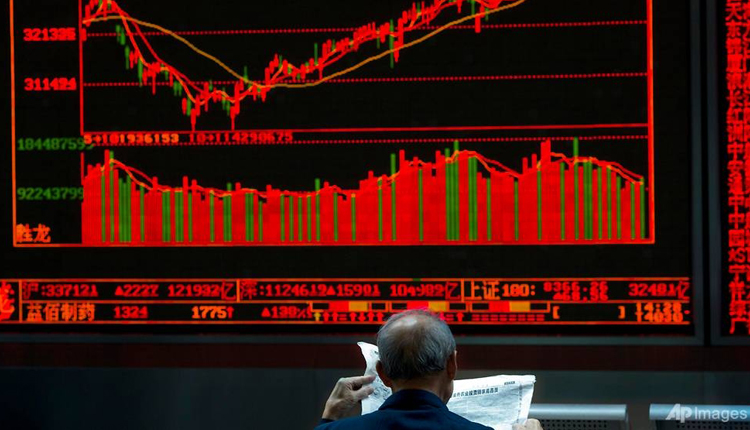Asian markets were cautious on the first trading day of 2019, following a turbulent 2018 that saw most major global stock exchanges end the year with significant losses.
South Korea’s Kospi slipped about 1.3 percent in afternoon trade, as shares of industry heavyweight Samsung Electronics fell 0.13 percent while chipmaker SK Hynix lost 0.33 percent.
The ASX 200 in Australia traded lower by more than 1.2 percent following an earlier recovery.
The heavily-weighted financial subindex fell 1.7 percent as shares of the so-called Big Four banks Down Under declined. Australia and New Zealand Banking Group traded down by 2.27 percent, Commonwealth Bank of Australia slipped 1.73 percent, Westpac declined by 1.96 percent and National Australia Bank shed 2.04 percent.
The Japanese stock markets are closed for a public holiday on Wednesday.
One investor warned that 2019 could be a “continuation” of 2018.
“We expect to see a lot more volatility to continue to plague markets, at least in the foreseeable future,” Ken Wong, Asia equity portfolio specialist at Eastspring Investments, told CNBC’s “Street Signs” on Wednesday.
“You do have a lot of uncertainty still over geopolitical noise that’s going on. You have earnings gradually slowing down a bit and so, as a result, you know, you’re not seeing a lot of … positive sentiment and good vibes in the market place,” Wong said.
Chinese manufacturing activity shrinks
Chinese shares slipped by the end of the morning session. The Shanghai composite fell about 1 percent while the Shenzhen composite shed 0.474 percent and the Shenzhen component lost 0.761 percent.
The moves came after a private survey showed manufacturing activity in China contracted for the first time in 19 months in December.
The Caixin/Markit Manufacturing Purchasing Managers’ index (PMI), fell to 49.7 from 50.2 in November — its first contraction since May 2017.
A reading above 50 indicates expansion, while a reading below that level signals contraction.
Economists polled by Reuters had expected only a marginal dip from November to 50.1.
“It is confirming that we know that the trade war has had an impact,” Gareth Nicholson, head of fixed income at Bank of Singapore, told CNBC minutes after the data release on Monday. Nicholson was referring to the ongoing Sino-U.S. trade war.
“The stimulus measure is probably needed if they want … to kind of keep up the growth levels that they have had. The PMI is kind of showing that,” Nicholson said.
Official manufacturing PMI released on Monday showed a slowdown in activity for the month of December as the sector contracted for the first time in more than two years, dropping below the critical 50 level.
Referring to Monday’s data, Vishnu Varathan, head of economics and strategy at Mizuho Bank, said in a morning note: “China’s manufacturing PMI slumping to almost three year-lows of 49.4 (the first contractionary read since mid-2016 and lowest since Feb 2016) justifiably raises a few red flags; and not just for China, with Asian exporters likely to feel the ripples.”
“The devilish details arguably render this slump even more worrying; even if the downturn is not entirely surprising given more challenging global trade conditions,” the economist said.
The private survey focuses on small and medium-sized enterprises while the official PMI gauge focuses on large companies and state-owned enterprises.
Meanwhile, Hong Kong’s Hang Seng index fell almost 2.4 percent, with shares of Chinese tech heavyweight Tencent declining by 1.85 percent.
Xi urges Trump to cooperate
Chinese President Xi Jinping told U.S. President Donald Trump on Tuesday that history showed cooperation was the best way forward for both the United States and China.
In a congratulatory message to Trump, marking 40 years since the establishment of diplomatic relations between the two countries, Xi said China-U.S. relations have experienced ups and downs but have made historic progress over the past four decades, according to state news agency Xinhua.
Xi’s comments came on the back of Trump’s tweet that a “long and very good call ” had taken place between the two.
Both Trump and Xi agreed to a 90-day pause in tariff escalation in December 2018. The two countries have made plans for face-to-face consultations over trade in January, China’s Commerce Ministry said recently.
The ongoing Sino-U.S. trade war dominated headlines for much of 2018 as they rattled global stocks, with both Chinese and U.S. markets seeing their worst annual performances in a decade.
Xi also delivered a major speech in Beijing on Wednesday about China’s ties with Taiwan, a highly sensitive issue dominating Chinese politics. The Chinese leader reiterated his stance that the island is part of China and said foreigners should not intervene in matters related to Taiwan’s independence.
Currencies
The U.S. dollar index, which tracks the greenback against a basket of its peers, was at 96.195 after seeing an earlier low of 96.127.
The Japanese yen was at 109.35 against the dollar after touching lows above 110.4 on Monday. The Australian dollar traded at $0.7003 following an earlier high of $0.7053.
Source: CNBC


